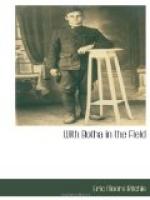[Illustration: Towards Windhuk. A quick railway repair after the Germans’ usual practice of blowing up railway bridges] [Illustration: Towards Windhuk. The first train to Windhuk. The South African Engineer Corps Construction Party aboard] [Illustration: At Windhuk. How we treat the German women. Ten minutes after occupation]
[Illustration: At Windhuk. The Commander-in-Chief addresses his massed troops from the Rathaus ]
The conduct of the South African troops should assuredly be noted. The very confidence of these German townspeople that they had nothing to fear from the hated troops of the British Union of South Africa was eloquent. The thing stood out, a piece of bitterest irony in connection with a people whose kindred across the seas were making civilisation shudder at their atrocities afloat and ashore. The news of the Lusitania massacre on the high seas reached Karibib just after occupation. Did one Teuton in the place have to suffer as a consequence even the insult of a word? No. What would the Germans have done? General Botha’s forces had crossed a desert through which it was the open boast of the enemy that it was strewn with mines and with every well poisoned. Was a single defenceless citizen of Windhuk or Karibib the worse for it after the occupation? Not one. The greater part of General Botha’s forces were on a half—a quarter—an eighth rations when they made Karibib, Okahandja, Okasise, Waldau and the capital; they lived until all supplies could come up on less than one biscuit a day, a pinch or two of meal, and fresh meat.
How much looting occurred in these towns?
There was none worthy the name.
Everyone was guarded. A few hours after the places were entered the orders were issued threatening severe and instant penalties should any looting be done by the hungry troops; officers, etc., were quietly billeted; and to the houses occupied by women and marged with a white cross no one unauthorised was allowed any approach whatsoever.
It was magnanimous, it was magnificent. But I
wonder if the chivalrous
Teuton would call it war!
Karibib, the practical junction of the railway running north to Grootfontein, the enemy’s new “capital,” was made Army Headquarters. General Botha hoisted the flag at Karibib and proclaimed it on the 6th of May, spent a few days settling matters at Karibib, and on the afternoon of the 11th set out for Windhuk by motor, formally to enter the capital. With him the Commander-in-Chief took his Chief of Staff (Colonel Collyer), Lieut.-Colonel de Waal (Provost Marshal), Major Bok (Military Secretary), Major Trew (Officer Commanding Bodyguard), Major Liepoldt (Chief Intelligence Officer), Major Esselen (Staff), an escort from the 4th Battery South African Mounted Riflemen and Bodyguard. Overnight the Headquarters party “outspanned” at Okasise on a beautiful camping-ground, and, meeting the Burgomaster of Windhuk




